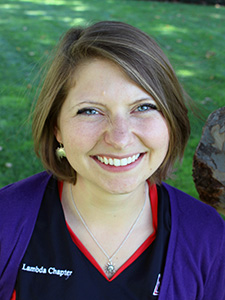Laura Zinke
University of Southern California
Active microbial carbon cycling in Baltic Sea Basin sediments
Active microbial carbon cycling in Baltic Sea Basin sediments
Abstract
 Microbes are active players in the geochemical cycling of sediments, and drive the remineralization of up to 97% of the organic carbon that reaches the seafloor. Greenhouse gases such as CO2 and CH4 are produced as end products of microbial organic degradation. However, responses of deep sediment microbial communities to variations in conditions during and after deposition are poorly understood. IODP Expedition 347 – Baltic Sea Paleoenvironment collected four microbiology-designated sediment cores documenting glacial-interglacial cycles. This project focuses on how active microbial communities produce and degrade organics in Baltic Sea sediments deposited during these environmental shifts.
Microbes are active players in the geochemical cycling of sediments, and drive the remineralization of up to 97% of the organic carbon that reaches the seafloor. Greenhouse gases such as CO2 and CH4 are produced as end products of microbial organic degradation. However, responses of deep sediment microbial communities to variations in conditions during and after deposition are poorly understood. IODP Expedition 347 – Baltic Sea Paleoenvironment collected four microbiology-designated sediment cores documenting glacial-interglacial cycles. This project focuses on how active microbial communities produce and degrade organics in Baltic Sea sediments deposited during these environmental shifts.
Biography
I have always been curious about the microorganisms in our natural environment, stemming heavily from a childhood exploring local streams armed with a microscope. As an undergraduate at Texas A&M University, I joined a microbial ecology group on a project examining microbial bioremediation of polychlorinated ethylene contaminated site. I became fascinated by how microorganisms influence local chemical cycling, which led to my interest in biogeochemical cycling in Earth’s massive subsurface realm. In my Ph.D. at the University of Southern California with Drs. Jan Amend and Brandi Reese, I characterize microbial communities in the deep biosphere to connect their activities to geochemistry, understand the pathways driving carbon cycling, and search for metabolic biosignatures that could be preserved in the rock record.